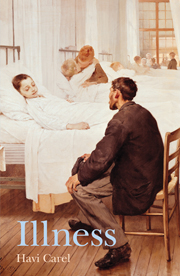Book contents
Introduction
Summary
The first time I realized I couldn't do something I felt surprise. It came as an insult, an affirmation of my limited existence. I had just moved back to the UK and gone to a circuit-training class. The class consisted of a number of exercises, including skipping, weights and push-ups. There were a handful of people in the class, including two slim girls. I was OK the first few rounds, but as we continued, I was less and less able to breathe. No, it wasn't my muscles or agility, or the weights; it was my lungs. I couldn't breathe. The instructor looked at me with pity. Unfit, he must have thought; lazy woman. I was slower and slower, did fewer repetitions in each round, and couldn't, for the life of me, skip. All the while the two slim girls were going strong, lifting, bending, jumping and skipping. I came out of that class feeling disappointed, beaten. Why could everyone else do this and I couldn't? Why was I so breathless?
That weekend I went to a spinning class. We rode on stationary bikes and added dumb-bell exercises to the cycling. The same inability struck me again. When we were sprinting I had to reduce the bike's resistance to zero. Even so I could barely breathe. Again, I left the gym feeling devastated. Why was I so unfit? By then a creeping suspicion entered my mind: something was wrong, very wrong. But my naive internet searches revealed nothing. I went to see my doctor, who ordered a breathing test and an X-ray. These began to reveal the true extent of my problem. My lung capacity was down to 47 per cent of the predicted average for my age and size. My lungs were grossly hyper-inflated, the X-ray showing a mysterious reticular structure. The radiologist recommended “further imaging”. “What could it be?” I asked the doctor. “I don’t know,” she said. “I’ve never seen anything like this. You have the lungs of a sixty- year-old who’s been smoking a pack a day since they were fifteen.” “But I don’t smoke,” I said. “And I’m completely normal and I’ve always been so healthy.
- Type
- Chapter
- Information
- Illness , pp. 1 - 22Publisher: Acumen PublishingPrint publication year: 2013



